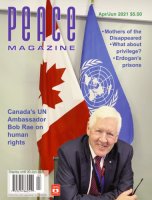
Peace Magazine April-June 2021, page 27. Some rights reserved.
Search for other articles by Nancy Covington (reviewer) here
Recovery: Peace Prospects in the Biden Era
By Douglas Roche. Kindle/Kobo e-book, 2020
Douglas Roche—prolific author, member of Order of Canada, former parliamentarian, senator, Canadian Ambassador of Disarmament, current supporter of the United Nations and a staunch peace activist—has provided yet another thoughtful analysis of the current political landscape.
Recovery describes the state of affairs that Biden has inherited, the choices and possibilities he may face during his time as president and, finally, suggestions for a Canadian response during the Biden era.
Roche begins by describing the “triple emergencies” facing the world today, which include the coronavirus pandemic, climate change, and nuclear disarmament. In his words, “COVID-19 laid bare the inequalities in the economic and social systems around the world—the precise problem the Sustainable Development Goals were established to fix.”
Indeed, the pandemic diverted funds away from Sustainable Development Goals (SDG), but Roche states, “If we look around, there is a huge pot of money available for human needs—if governments could stop being spooked and, in many cases controlled, by the military-industrial complex.”
Reining in the military-industrial complex will be a necessary task for progress, not just for nuclear disarmament but also if the world is going to tackle other pressing issues. Roche spends much of the book discussing this. “The American political system has been corrupted by militarism.” The lack of media coverage about the massive spending increases to modernize nuclear weapons has been blamed on the fact that Democrats and Republicans alike benefit from political donations from the arms industry.
“This is the system that President Biden will have to deal with.” Roche laments, “What does it say about our civilization when governments spend on building the conditions for peace only 2.7% of what they spend on preparing for war?” As Roche also notes, Canada’s investment on diplomacy represents just five percent of the amount spent on its military.
Recovery could be given a subtitle as a primer on the United Nations, especially about movements to develop the Right to Peace. The concept of a culture of peace is elaborated, and the forward-looking Declaration on the Commemoration of the 75th Anniversary of the U.N. is printed in full in the appendix. Despite its imperfections, Roche cautions that “to tear down the framework” of the United Nations “would return civilization to a jungle mentality”.
Roche, who met Biden in 2001 when both were senators, has been following Biden’s career via his writings and speeches. Roche describes Biden as a “pragmatic idealist”, an “ameliorator” who, with 44 years in office, knows a few things about how people operate. “We’ve got to listen to the other guy,” Biden is quoted as saying prior to the election. Biden has already rejoined the Paris Agreement, and will probably bring a positive attitude of co-operation to the U.N. Security Council, rejoin the Iran deal, and generally bring civility back internationally.
Roche cautions that Biden can’t do it all. “The problems are so big, they require transformational thinking”, especially with regards to weaning away from fossil fuel to renewable energy and to eliminating nuclear weapons. Roche asserts that governments do respond to public demands on these two particular issues but it is up to the public to mobilize and create pressure.
During a Biden presidency, Roche has a list of suggestions for Canadians. Canada could put teeth into the Paris Agreement. Canada could allocate 10 percent of its military budget to the SDGs, thereby leading other countries by example. Canada could support the Treaty on the Proliferation of Nuclear Weapons (TPNW) and “open a dialogue with NATO to bring the alliance into conformity with the TPNW and end its reliance on nuclear weapons”. Canada could challenge the major nuclear powers “to fulfill their legal obligation to negotiate the elimination of nuclear weapons”.
Cooperation is another repeated theme throughout the book, with cooperation being “Biden’s strongest card”. Indeed, with the “triple emergencies”, Roche maintains cooperation has “never been so necessary” for our very survival. In addition, he maintains that we must move away from a militarist mind-set toward a culture of peace.
Roche writes: “Biden’s openness to the human security agenda enables Canadians to find its voice again.” “There is even a possibility that Canada can, once again, be Canada.”
Let us hope.
This book is an inspiring read and quintessential Roche.
Reviewed by Nancy Covington, a physician in Halifax.

Peace Magazine April-June 2021, page 27. Some rights reserved.
Search for other articles by Nancy Covington (reviewer) here